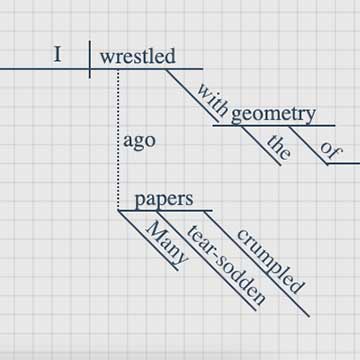This Month’s Featured Article

First Person Singular
 Many tear-sodden, crumpled papers ago, I wrestled with the geometry of diagramming sentences (yes, I went to Catholic school). A two-word sentence was simple enough, all horizontal and vertical, but when things went all 45 degrees, and sentences became complex and compound, my diagrams resembled a thicket more than a pine branch.
Many tear-sodden, crumpled papers ago, I wrestled with the geometry of diagramming sentences (yes, I went to Catholic school). A two-word sentence was simple enough, all horizontal and vertical, but when things went all 45 degrees, and sentences became complex and compound, my diagrams resembled a thicket more than a pine branch.
There is something comforting about sentence diagrams, though: a clarity of thought and organization that dictates that every word serves a purpose and that there ought to be a relationship among words and clauses that serves clear communication. Facility with diagramming sharpens the writer’s pen to gash unclear pronoun referents and invert passive constructions, two slovenly writing habits that are worthy of gashing.
Artificial intelligence
The mathematical and algorithmic qualities of diagramming evoke nun’s habits (at least for me), but now computers can lean into those qualities to generate constructions like the paragraph at left of this article, which was composed by artificial intelligence. Because English can be reduced to a set of rules, one can feed those rules into a computer and get it to produce orderly prose of perfectly yeomanlike quality.
For the contemporary yeoman/Loman, that might be just fine. The uninspired inter-office memo need not rally the troops a la St. Crispin’s Day, and if one can muster up enough one-liners to constitute a wedding speech, that may be all the literary skill one needs to get through life. It’s a little depressing to think about, but I can’t imagine that accountant-to-accountant missives benefit much from rhetorical embellishment.
Man vs. machine
For those of us who appreciate literature, however, it is worth considering the distinction between computer-generated prose and human compositions. When charged with creating a paragraph of its own, ChatGPT created the header paragraph, opting for a first-person plural voice, cloaking itself in the guise of an unidentified multitude – a faceless, corporate “we” – to avoid the messy frailties of a real human narrator. This is a stylistic move, of course, but it is also a necessity: there is no singular identity for the voice to assume. The bot never endured second grade with Sister Anne, and it never noticed diagrammed sentences in pine boughs. The technology is essentially a language-prediction tool: what is the most likely word to appear next, based on bazilions of examples online?
In homage to Sister Anne (God rest her grammar-loving soul), and in celebration of the first-person voice and human frailty, I dusted off my diagramming skills on the first sentence of my own writing to see just how well my prose would align with the dogma of grammar:
• The subject and predicate are clear enough, and while the sentence is heavy with adjectives, I admired the way the prepositional phrase fell into place. It does get a bit unruly around “papers ago,” though: the dependent clause that introduces the sentence clearly modifies “wrestled,” describing when the wrestling took place, but I am using “papers” as one might use “years” in a more parochial construction.
Sister Anne would no doubt unsheath her red pen on my transgression, but it is exactly the sort of rhetorical sleight of hand that would elude artificial intelligence. Part synecdoche, part symbol, “papers” represent my toils with grammar, and although “ago” is an adverb and therefore must modify the verb, it really isn’t describing the action of wrestling as much as hearkening to an earlier version of myself.
• As I was writing this piece, my daughter sent me an article from The New Yorker by one of my favorite contemporary writers, Jia Tolentino. It included this line describing the posters for the Chinese dance performance troupe, Shen Yun: “The colors reminded me of early-two-thousands going-out tops, and Lisa Frank, and the glittery posters of fruits and vegetables that I used to see at the bazaar when I lived in Kyrgyzstan.”
I was not going out in the early two-thousands, much less in a “going-out top.” I had to look up who Lisa Frank was (and I am still not sure why she is the go-to maven for rainbow-festooned apparel), and I’ve never lived in Kyrgyzstan or seen their glittery produce posters. But somehow, all of the references brought into relief the images I have seen of Shen Yun, slapped on I-84 billboards and taped inside the windows of dry cleaners. More importantly, they bring me into the singular viewpoint of a writer.
Superficially, I have little in common with Tolentino, a Filipino-Canadian who migrated to Houston, where she attended a megachurch before attending the University of Virginia and working as a Peace Corps volunteer in Kyrgyzstan. But she can write. And through that medium, I see what she sees, and I start to understand why she is so unsettled by the propaganda of Shen Yun or, reading on, feminism, Britney Spears, and Karen O. She writes her world into my imagination.
70 articles over seven years
Over the past seven years, Main Street’s owner and editor, Thorunn Kristjansdottir, has allowed me to share my concerns with you – a pilgrimage that has taken me from Hudson to Cornwall and from e-bikes to brain research. I am proud of the seventy articles I’ve written over that period of time. They tell a story about this area, these times, and my perspective that is as unique as my fingerprint. It has been a privilege to share my musings with a readership that eagerly scoops up copies of Main Street wherever they find it and quite often shares their thoughts with me when I see them… on Main Street.
Perhaps in the future, artificial intelligence will produce prose in my exact style and voice. It is, after all, a language prediction technology: given enough of my writing, it could probably anticipate the next word to appear in a sentence.
But I’m optimistic that life itself will continue to throw AI off the scent by simply remaining as unpredictable as it always has been, offering opportunities each day to use writing to comprehend the meaning of it all. Seven years ago, I could not have anticipated writing a piece on credible artificial intelligence, but I also could not have anticipated wondering how a magazine would survive a pandemic. Yet here I am, still writing, first person, singular. I don’t think that will change. •



